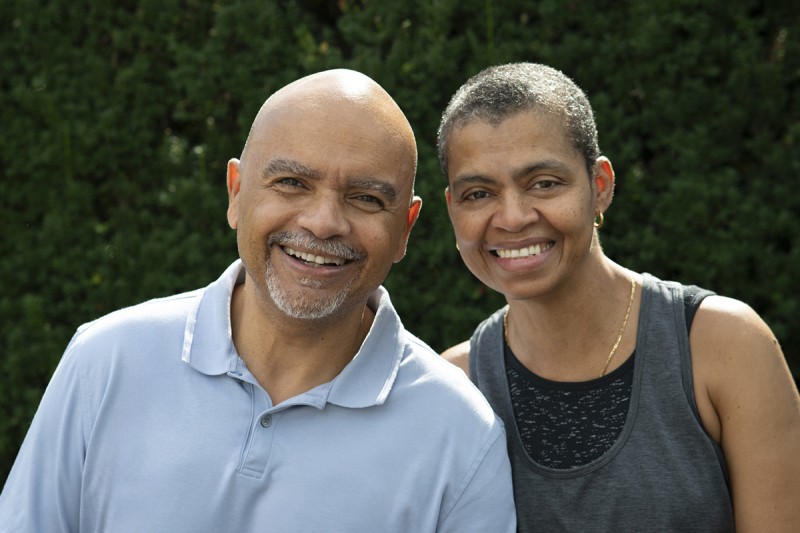
Antonio Lekhrajmal knew his diagnosis of advanced stomach cancer — also called gastric cancer — was extremely serious.
He credits his doctor, Memorial Sloan Kettering Cancer Center (MSK) gastrointestinal oncologist Yelena Janjigian, MD, with being upfront with him, and treating him with immunotherapy.
“She said that stage 4 stomach cancer is very hard,” he recalls. “But she told me, ‘Together, we’re going to do everything possible to help you.’ ”
Today, more than five years after his diagnosis, Antonio is thankful to be doing what he loves — spending time with his wife, Maria, and daughters and pursuing his artwork after nearly 30 years in the custodial department of the Livingston, New Jersey, school system.
The Innovative Immunotherapy MSK Offered Antonio for Metastatic Gastric Cancer
The treatment that made the difference for Antonio and people facing similar cancers is the immunotherapy known as checkpoint inhibitors. As Chief of the Gastrointestinal Oncology Service at MSK, Dr. Janjigian is at the forefront of efforts to investigate how they can help more people.

In fact, clinical trials she led using checkpoint inhibitors were cited by the U.S. Food and Drug Administration when it approved this therapy as “the first treatment in more than a decade to show survival benefit for people with metastatic gastric cancer who are being treated for the first time.”
The success of these clinical trials joins a growing list of advances with checkpoint inhibitors that have been pioneered by MSK scientists and clinicians for more than two decades.
How Checkpoint Inhibitors Work
The cells of the immune system are so powerful that they contain a built-in brake to prevent them from attacking healthy cells by accident. Cancer cells, says Dr. Janjigian, “are normal cells gone rogue.” So they can sometimes trigger the brake, effectively disguising themselves as normal cells and deceiving immune cells into leaving them alone.
Checkpoint inhibitors expose the deception by preventing cancer cells from activating the brake. “They uncloak the cancer cells,” says Dr. Janjigian, “making them more visible to the immune system and allowing it to attack the cancer cells and suppress them from coming back.”
Dr. Janjigian adds, “The reason this works so well is that the immune system can continue doing surveillance and attacking cancer cells longer than other treatments like chemotherapy.”
Which Cancers Are Treated by Checkpoint Inhibitors?
Checkpoint inhibitors are remarkably powerful and adaptable — much like the immune system itself.
They can be used for local cancer that hasn’t spread, as well as for metastatic cancer.
In a small but impactful study at MSK, checkpoint inhibitors used alone made rectal cancer disappear entirely in a group of patients whose tumors had a specific genetic mutation. MSK researchers are now investigating this use of checkpoint inhibitors in other cancer types.
Checkpoint inhibitors have proved themselves effective in treating many forms of cancer, including:
Dr. Janjigian says this form of immunotherapy is particularly useful in gastrointestinal (GI) cancers, including:
- esophagus
- colorectal
- gastric
- liver
“These kinds of tumors are driven by several different genetic abnormalities and are very complex,” she says.
How Checkpoint Inhibitors are Used With Other Cancer Treatments
Using checkpoint inhibitors in combination with other therapies offers new options.
They can be combined with chemotherapy and used before or after surgery and radiation. And they strengthen other forms of immunotherapy, such as vaccines and cellular therapies like TIL.
Making Checkpoint Inhibitor Immunotherapy Work for More People and Cancer Types
Dr. Janjigian stresses that immunotherapy, including checkpoint inhibitors, doesn’t work for everyone. In some cancers, only a small percentage of people see substantial improvement.
“Making this work for more people is the next big leap for researchers at MSK,” she says. Among the areas being investigated, Dr. Janjigian cites the “genetics of the tumor itself, as well as where it sits in the body and how easily it can be infiltrated by immune cells.” Perhaps most important, Dr. Janjigian explains, is the person’s own body: “How well does their immune system work in general, and how does that affect treatment?”
Dr. Janjigian says, “Understanding these factors is why it matters so much where you go for treatment. Using immunotherapy can affect the entire trajectory of a person’s care. Getting the right expertise is crucial.”
MSK’s Expertise With Checkpoint Inhibitors
Antonio’s treatment involved regular infusions of checkpoint inhibitors along with chemotherapy. Together, this treatment shrank his tumor enough that it could be surgically removed by Vivian Strong, MD. Antonio says recovery from the treatment was challenging. But “after surviving cancer,” he says, “I know what’s really important in life, and I have Dr. Janjigian to thank.”
For her part, Dr. Janjigian is thankful to be able to offer checkpoint inhibitors. “I can now look people in the eye who have stage 4 disease and say there’s a possibility they will live with this disease, rather than live in fear.”